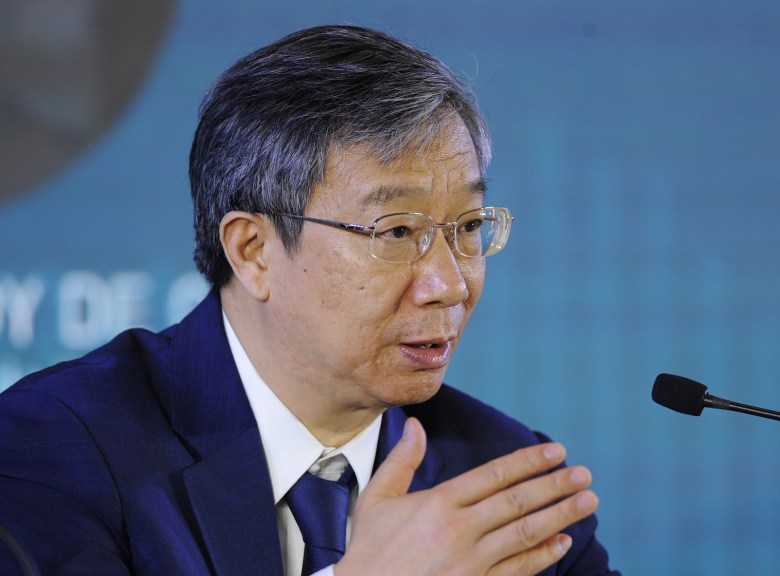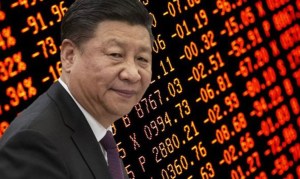This past Monday (October 24), the Hong Kong China 50 Index, which includes the top 50 Chinese companies listed in Hong Kong, Shanghai, and Shenzhen, dropped nearly 6% on heavy volume.
Stocks with significant foreign holdings were hit particularly hard, with Alibaba, Tencent and Meituan each tumbling more than 10%. Overseas investors sold a record net $2.5 billion of mainland shares via the Shanghai-Hong Kong Stock Connect. The RMB declined to its weakest level since 2007.
Foreign dumping of Chinese assets reflected the poor reception by the international community of the unveiling of the new Chinese leadership lineup on Sunday. Western news coverage focused on the fact that the members of the new Standing Committee of the Politburo have strong ties with CPC General Secretary Xi Jinping.
One western commentator wrote: “This is a leadership that will be focused on achieving Xi’s political goals, rather than pursuing their own agendas for what they think is best for the country.”
We beg to differ. In the past, a new Chinese president often had to spend more of his first term consolidating his power than on getting things done.
The fact that Xi in his third term will not have to engage in factional political infighting should allow him to focus his energy on implementing his policy agenda.
Moreover, and more importantly, the fact that Xi has brought a political leader with the experience and background of Li Qiang onto the Standing Committee, in the number two position and as the presumed premier, tells us that the market is thoroughly misjudging Xi’s own policy direction.

Over the past ten years, as Premier Li Keqiang ruled over the “North Palace” (the State Council) and President Xi over the “South Palace” (the CPC Secretariat), there was no outright rivalry or positional jockeying between Li and Xi.
But there was friction, there were disagreements over policy priorities, and – most relevantly – impatient complaints from the “South” over the lack of expeditious execution of policy.
Now this friction will disappear. Most policy papers authored by Xi while he ran Zhejiang province were drafted by his secretary Li Qiang. This Li will have a freer, more trusted hand than his predecessor.
Who is Li Qiang? A loyalist, says the commentariat, satisfied with a dismissive term and too lazy to inquire further.
Li is a native of Wenzhou, one of China’s highest-income cities. It was the first major city to initiate and embrace economic reform in 1978, was the first to set up private enterprises and hasn’t stopped since. Per capita income over the period has grown 500-fold.
Wenzhou is also known as the cradle of mathematicians of the Greater China region. Shu Shien-Siu (born 1912) hails from Wenzhou, did his graduate studies in the 1940s at Princeton and MIT, later – from 1979 to 1988 – was the chairman of the Industrial Technology Research Institute of Taiwan and helped to establish the world-famous Hsinchu Science and Industrial Park (HSIP) and thus is widely known as the “Father of HSIP,” housing the “Silicon Valley” industries of Taiwan.
Li started his political career in Wenzhou as party secretary. Following that, with an MBA from Hong Kong Polytechnic University, one of Asia’s best, he worked with Xi in Zhejiang, became governor of the province in 2013 and in 2017 advanced to party secretary of Shanghai.
He made the development of high-tech industries and financial and technological innovation in the Shanghai Special Economic Zone his hallmark achievement.
And then he failed to deal effectively with the Covid Omicron virus in Shanghai, reportedly reacting too late to the outbreak. Politburo “Iron Lady” Sun Chunlan was sent in to impose a harsh lockdown. Xi nonetheless wants his experience and reform drive to run the Chinese economy. Sun, meanwhile, has been retired.

As premier, Li will have a competent team of similar pedigree as vice-premiers. Newly appointed politburo members Zhang Guoqing, Liu Guozhong and Yin Li are tipped to serve on Li’s new State Council team come March 2023.
Zhang will oversee industrial policy. Currently party secretary of Liaoning, he previously served as mayor of megacities Chongqing and Tianjin. He holds a doctorate in economics from Tsinghua University and attended an executive management course at Harvard Business School.
Liu is the party secretary of Shaanxi Province, birthplace of Xi’s father. He previously served as deputy party secretary of Sichuan. Liu holds a graduate degree from the Harbin Institute of Technology and is designated to take charge of agriculture and food production.
Yin Li is the party secretary of Fujian Province. He is a health professional and has held leading positions in the China Food and Drug Administration and at the WHO. Between 2002 and 2003 Yin completed a study term as a visiting scholar at the Harvard T H Chan School of Public Health. He has served as vice minister of health.
Two further key appointments expected in March are the replacements for vice-premier Liu He (age 70) and for PBOC governor Yi Gang, both of whom will retire.
Liu He will hand his mandate over to He Lifeng, the current head of the National Development and Reform Commission (since 2017) and newly appointed politburo member. He Lifeng has collaborated closely with Liu in running economic and financial policies.
He studied finance at the Xiamen University School of Economics and obtained a PhD degree. He began his political career in the Xiamen municipal government and was instrumental in establishing the Xiamen special economic zone.

The most likely successor to Yi Gang at the PBOC is Yin Yong, 53, a former deputy central bank governor and current vice party chief in Beijing. He has a PhD from Tsinghua University and a master’s degree in public administration from Harvard University.
Yin ran the State Administration of Foreign Exchange for seven years and is an experienced international monetary economist. Since 2018, he has worked closely with Beijing party secretary Cai Qi, a new Standing Committee appointee.
Li Qiang will lead a veteran team of administrators and economists, with ample international experience, committed to reform, further opening of the economy and technological innovation.
These are the Xi loyalists. More important for China’s direction during the next five years are their qualifications and their policy precepts. Loyalism tells us little. But the fact that Xi has picked this particular group of loyalists tells us something critically important about Xi and his policy direction.

